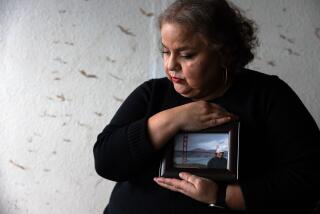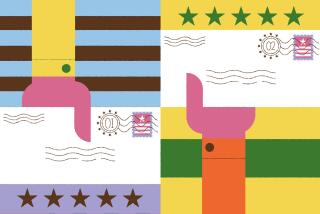Almost 66 Years After Career Soldier’s Death, a Niece Seeks Citizenship for Him
- Share via
1st Sgt. John Castellano thought 26 years of military service had won him U.S. citizenship.
When he learned it had not, the Italian immigrant was shocked.
“I have been working day and night for the American Army,” Castellano wrote in 1937. “I thought that if a man had served in the Army for seven years he was automatically a citizen of the U.S..... I may not be a citizen by law, but I am at heart.”
Then, after apologizing for his poor penmanship and signing all his possessions over to his brother, Castellano killed himself by drinking a bottle of shoe dye.
Now, almost 66 years after Castellano’s death, a niece he never lived to see is waging a campaign to win him posthumous citizenship. For more than 2 1/2 years, Joyce Hall of San Pedro has petitioned the White House and local legislators for help.
Hall, 65, has had little luck so far, but renewed her appeals when she read recently that soldiers in Iraq were receiving posthumous citizenship.
“What happened to my uncle is a dishonor,” Hall said. “I just want a piece of paper showing that he’s a citizen, something I can put on his grave.”
Under federal law, posthumous citizenship can be granted to military personnel who die as a result of their service, but application must be made within two years of their deaths. Castellano’s application is more than 60 years late, according to the Bureau of Citizenship and Immigration Service.
Recently, Reps. Dana Rohrabacher (R-Huntington Beach) and Jane Harman (D-Venice) agreed to support a “private relief” bill seeking posthumous citizenship for Castellano. Both say the odds of its passing are slim, but there are no other options.
Of the roughly 5,000 bills that are introduced each session, about 50 are passed into law, and very few are private relief bills. Even if it does pass, it must be signed by Homeland Security Secretary Tom Ridge.
Hall said she will not accept refusal.
“I don’t understand politics,” she said. “But I do know he deserves this.”
It was about five years ago when Hall learned she had a paternal uncle. Her parents never mentioned him, and Castellano left no children. She made the discovery after her parents died, when she found the suicide letter, service medals and correspondence between Castellano and her father.
“I was going through some of my mom’s old stuff,” Hall said. “I was shocked. My birthday is the day he died, but a year later.”
Hall has pieced together a few details of Castellano’s life in the service, but she lacks such basic information as his age, because conflicting birth dates are given. She believes he was in his 40s when he died.
Castellano immigrated to the U.S. from Sorrento, Italy, when his father sent for him in 1907, according to his suicide note. Hall said she thinks her uncle stayed a short time with her father, a greengrocer in Long Island.
Four years after arriving in the United States, Castellano joined the Army. During World War I, he was stationed in Cuba.
In his suicide letter, Castellano wrote that had he had applied for citizenship shortly after he enlisted.
“Ever since, I have occupied all my time with military duties and I presumed that I was automatically a citizen of the U.S. I have learned that during the war a provision was made to naturalize all aliens, but I did not get that opportunity, as I was sent to Cuba.... I didn’t have the opportunity to be naturalized in the U.S.”
During America’s major conflicts, including both world wars, Vietnam and the Persian Gulf War, citizenship has been expedited for noncitizen members of the military. What happened to Castellano’s application, and how he learned that he had never become a citizen, remain a mystery.
Toward the end of his military career, Castellano was stationed in Hawaii. At the time of his death, he had been a first sergeant for 12 years. He was buried at Long Island National Cemetery in Farmingdale, N.Y.
Among the mementos of Castellano that Hall and an older brother keep are a framed display of his service medals, including a decoration for heroism he received for “saving life from the perils of the sea.”
Hall said she cannot explain why her parents never mentioned her uncle.
“Why didn’t anyone ever tell me about him? I don’t know. Maybe they were ashamed because he killed himself,” Hall said.
More to Read
Sign up for Essential California
The most important California stories and recommendations in your inbox every morning.
You may occasionally receive promotional content from the Los Angeles Times.










